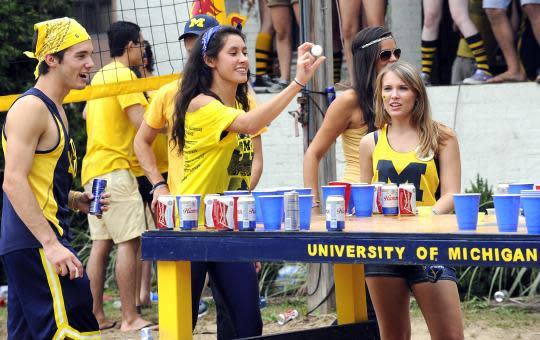University Will Tattle to Parents if Students Drink

Freshmen who violate the University of Michigan’s drug and alcohol policy could now find themselves in trouble with their parents too, thanks to a new school initiative. (Photo: Mark Bialek/Zuma Press/Corbis)
The University of Michigan unveiled a new policy this week aimed at curbing problem drinking by students on campus: a vow to call mom and dad behavior gets out of hand.
Parents of freshmen younger than 21, the pilot initiative states, will be notified if their children violate the school’s drug and alcohol policy — which bans drinking by students younger than 21 as well as the use of illegal drugs — more than once. Parents will also be contacted on a first violation if the incident includes property damage, a DUI, or the need for medical attention.
STORY: This Is When Your College Student Is Most Likely to Experiment With Drugs
The new rule focuses on first-year students, the university website explains, as “research shows they are an at-risk population” because of the transition to college, adding that the initiative is “part of comprehensive prevention efforts related to student use of alcohol and other drugs, including communication with parents/family.” With students set to move onto campus next week, the policy change comes just in time — especially considering the findings of a new study, which found that about 1,200 underage students a day try alcohol for the first time while in college.
STORY: ‘Sexist’? Or ‘Fun’? College Under Fire for Outrageous Banners
“It seems more schools have adopted this approach over the years,” Aaron White, senior advisor to the director of the National Institute on Alcohol Abuse and Alcoholism, tells Yahoo Parenting. “Alcohol use on college campuses has been a serious concern for a long time, and we haven’t discovered a silver bullet for dealing with it, so strategies continue to evolve.”
The idea of involving parents of college students — when it comes to any potentially dangerous situation, be it substance abuse or mental health issues — is a complex one. “It’s a difficult balancing act to both give students the opportunity to become independent and grow into young adults, but at the same time to keep them safe,” White says. “That seems to be the nature of the debate here.”
The University of Michigan is certainly not the first college to take this tack in an effort to curb drinking, with a school spokesperson pointing out to Yahoo Parenting that “parental notification has been utilized by many universities, including most other Big Ten schools as one component of a comprehensive program.”
While there are no recent stats regarding what percentage of colleges do notify parents in such cases — and also a lack of research showing whether it’s even an effective deterrent or not, White points out — it has been legal for universities to do since 1974, when Congress passed the Buckley Act, or the Federal Education Rights and Privacy Act (FERPA). That gave parents the right to know about such violations if the student is either under 21 or still claimed as a dependent by mom or dad. But many schools have been slow to implement it.
“Philosophically, many educators are resistant to the idea of policing students,” noted a 2014 New York Times article, “Why Colleges Haven’t Stopped Binge Drinking.” Instead, it said, “They would prefer to treat them as young adults who can make good choices with the right motivation.” The story quoted Traci L. Toomey, who directs the Alcohol Epidemiology Program at Minnesota’s School of Public Health, who recalled visiting a campus that was proud of letting students be in charge of how much alcohol was provided at social events — “as if somehow magically they’d do a great job.” The article also said that students themselves say stronger enforcement could change their behavior — with one survey of those who had violated college alcohol policies finding that parental notification, brushes with the law, or requirements to enter an alcohol treatment program would be better deterrents than fines or warnings.
Still, despite a history of reticence by universities, “There’s been a general warming to the idea of contacting parents lately,” White says.
From schools’ standpoint, parental notification has the potential to both keep kids from self-destructing and, possibly, the university from being found liable in some way. But some students, of course, may have an attitude of, “Look, I’m an emerging young adult here,” White said. “I think the intentions are good here.”
Teen and adolescent psychologist Barbara Greenberg agrees. “I think this is wonderful,” she tells Yahoo Parenting. “Kids are still very attached to parents at this age, even though that’s a well-kept secret. They are still teenagers, and much more worried about disappointing their parents than they are about making them angry.” That’s because disappointment, she explains, is a “softer, more loving kind of emotion that’s harder to tune out.” So also taking into account teens’ fear of humiliation, Greenberg says, she is “absolutely sure this would be a deterrent.”
Please follow @YahooParenting on Facebook, Twitter, Instagram, and Pinterest. Have an interesting story to share about your family? Email us at YParenting (at) Yahoo.com.



